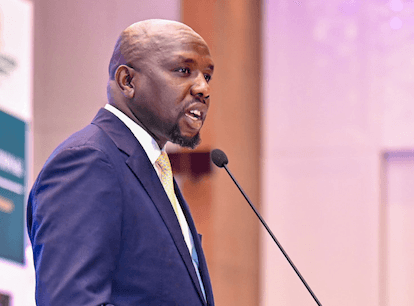Kenya has missed key deadlines set by the International Monetary Fund (IMF) aimed at strengthening austerity measures.
An analysis by the Star shows that Kenya missed the September 30 deadline to present a strategy on how to tackle its close to Sh728 billion in pending bills that have seen some businesses close shop.
According to the structural benchmarks set by the fund in the fifth review of the $2.3 billion facility approved in 2021, the National Treasury was to submit to the cabinet a strategy to validate the stock of outstanding pending bills and address public financial management shortcomings that gave rise to pending bills.
It was also to clear the verified pending bills over the medium term consistent with the consolidation path under our programme.
"Propose criteria for clearing validated arrears over an identified period consistent with our overarching objective to reduce debt and debt vulnerabilities by the end of September,'' IMF said.
According to the latest data from the National Treasury, the government arrears—grew by Sh81.5 billion in the same period between September 2021 and June last year. Government arrears had risen to Sh537.2 billion by the end of March.
State corporations owe a big chunk of the pending bills, Sh443.6 billion. Ministries, state departments and other government entities owe slightly over a fifth of the supplier debt, Sh123.9 billion.
Most of the pending bills owed by state corporations include payment to contractors, and suppliers, unremitted statutory and other deductions, pension arrears for Local Authorities Pension Trust, and others.
According to the data, the highest percentage of state agencies pending bills (64.4 per cent) belongs to contractors and Suppliers. Most of these bills consist mainly of historical ones pending for the last two years.
Yesterday, the National Treasury said it is systematically working to meet every commitment.
''The national government policy on clearance of pending bills continues to be in force. It is currently developing a comprehensive strategy to clear outstanding stock of verified pending bills of the national government over the medium term,'' the exchequer told the Star.
The Cabinet in June approved the establishment of a special committee on pending bills.
The Pending Bills Verification Committee will be tasked with the auditing of liabilities for the period between 2005 and 2022, which means contractors will have to wait longer.
Upon assumption of office, President William Ruto promised to deal with the problem of the pending bill issue once and for all.
"In the coming weeks, we will advise government creditors on the mechanisms for the resolution of their outstanding payments. We shall give priority to the expeditious resolution of pending bills.'' Ruto said.
Apart from pending bills, Kenya is yet to conduct and publish a special audit on the mechanism, efficiency, and effectiveness of supplementary budgeting, including under Article 223 of the Constitution.
This is expected to provide proper accountability and transparency on the supplementary budget spending by the various MDAs and to establish potential risks.
The country was accused by the fund of misusing the leeway to create a supplementary budget. It has been forced to add at least 15 per cent to its initial annual budget in the past four years.
The country is also still lagging behind in privatising loss-making state agencies. The deadline for this has since been revised twice.
Kenya has however in recent days acted on some activities whose deadlines had been fixed end of September and October.
It has for instance submitted to Cabinet for approval the draft of a new tax plan for the medium term to 2026.
It also completed a review of the fuel pricing mechanism, doubling Value Added Tax (VAT) on fuel to 16 per cent in the Finance Act, 2023.
This was to be done by the end of next month.
Kenya’s Special Drawing Rights (SDRs) quota at the IMF is currently at 542.8 million, or Sh91.8 billion (722.95 million), offering the country a critical buffer in case of external shocks.
SDRs are international reserve assets created by the IMF and allocated to members to supplement their existing foreign exchange reserves, allowing them to reduce their reliance on more expensive domestic or external debt for building reserves.



















